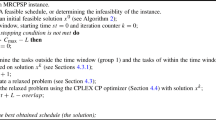Abstract
The project scheduling problem (PSP) is the subject of several studies in computer science, mathematics, and operations research because of the hardness of solving it and its practical importance. This work tackles an extended version of the problem known as the multimode resource-constrained multiproject scheduling problem. A solution to this problem consists of a schedule of jobs from various projects, so that the job allocations do not exceed the stipulated limits of renewable and nonrenewable resources. To accomplish this, a set of execution modes for the jobs must be chosen, as the jobs’ duration and amount of needed resources vary depending on the mode selected. Finally, the schedule must also consider precedence constraints between jobs. This work proposes heuristic methods based on integer programming to solve the PSP considered in the Multidisciplinary International Scheduling Conference: Theory and Applications (MISTA) 2013 Challenge. The developed solver was ranked third in the competition, being able to find feasible and competitive solutions for all instances and improving best known solutions for some problems.



Similar content being viewed by others
Notes
Constants included in the objective function presented in the MISTA Challenge problem description were omitted for the sake of clarity.
References
Alba, E., & Chicano, J. F. (2007). Software Project Management with GAs. Information Sciences, 177, 2380–2401.
Artigues, C., Demassey, S., & Néron, E. (2013). Resource-constrained project scheduling: Models, algorithms, extensions and applications. Hoboken: Wiley.
Asta, S., Karapetyan, D., Kheiri, A., Özcan, E., & Parkes, A. (2014). Combining monte-carlo and hyper-heuristic methods for the multi-mode resource-constrained multi-project scheduling problem. Technical report.: School of Computer Science, University of Nottingham.
Blazewicz, J., Lenstra, J., & Rinnooy Kan, A. (1983). Scheduling subject to resource constraints: Classification and complexity. Discrete Applied Mathematics, 5(1), 11–24.
Bresina, J., Bresina, L. (1996). Heuristic-biased stochastic sampling. In AAAI-96 Proceedings (pp. 271–278).
Coelho, J., & Vanhoucke, M. (2011). Multi-mode resource-constrained project scheduling using RCPSP and SAT solvers. European Journal of Operational Research, 213(1), 73–82.
Davis, M., & Loveland, D. (1962). A machine program for theorem-proving. Communications of the ACM, 5(7), 394–397.
De Marco, A. (2011). Project management for facility construction. Heidelberg: Springer.
Demeulemeester, E. L., & Herroelen, W. S. (2002). Project scheduling: A research handbook. Leuven: Kluwer Academic Publishers.
Fischetti, M., Lodi, A., & Salvagnin, D. (2010). just mip it!. In V. Maniezzo, T. Stützle, & S. Voü (Eds.), Matheuristics, annals of information systems (Vol. 10, pp. 39–70). New York: Springer.
Geiger, M. (2013). Iterated variable neighborhood search for the resource constrained multi-mode multi-project scheduling problem. some comments on our contribution to the MISTA 2013 challenge. Multidisciplinary International Scheduling Conference (MISTA) 2013 Proceedings 27–29 (pp. 807–811).
Hansen, P., & Mladenović, N. (1997). Variable neighborhood search. Computers and Operations Research, 24(11), 1097–1100.
Hartmann, S. (2002). A self-adapting genetic algorithm for project scheduling under resource constraints. Naval Research Logistics, 49(5), 433–448.
Józefowska, J., & Weglarz, J. (2006). Perspectives in modern project scheduling. New York: Springer.
Jünger, M., Liebling, T., Naddef, D., Nemhauser, G., Pulleyblank, W., Reinelt, G., et al. (2010). 50 years of integer programming 1958–2008. Heidelberg: Springer.
Kelley, Jr J.E., Walker, M.R. (1959). Critical-path planning and scheduling. In: Papers Presented at the December 1–3, 1959, Eastern Joint IRE-AIEE-ACM Computer Conference (pp. 160–173). ACM, New York, NY, USA, IRE-AIEE-ACM ’59 (Eastern).
Kerzner, H. (2009). Project management: A systems approach to planning, scheduling, and controlling (10th ed.). New York: Wiley.
Klein, R. (2000). Scheduling of resource-constrained projects., Operations research/computer science interfaces series Norwell: Kluwer Academic.
Kolisch, R., & Hartmann, S. (1999). Heuristic algorithms for the resource-constrained project scheduling problem: Classification and computational analysis. In J. Wglarz (Ed.), Project scheduling, international series in operations research & management science (Vol. 14, pp. 147–178). New York: Springer.
Kolisch, R., & Hartmann, S. (2006). Experimental investigation of heuristics for resource-constrained project scheduling: An update. European Journal of Operational Research, 174(1), 23–37.
Kolisch, R., & Sprecher, A. (1997). PSPLIB—a project scheduling problem library. European Journal of Operational Research, 96(1), 205–216.
Kone, O., Artigues, C., Lopez, P., & Mongeau, M. (2011). Event-based MILP models for resource-constrained project scheduling problems. Computers and Operations Research, 38, 3–13.
Lourenco, H. R., Martin, O. C., & Stutzle, T. (2003). Iterated Local Search. Boston: Kluwer Academic Publishers.
Maniezzo, V., Stutzle, T., & Vo, S. (2010). Matheuristics: Hybridizing metaheuristics and mathematical programming (Vol. 10). Leuven Belgium: Springer.
Möhring, R. H., Schulz, A. S., Stork, F., & Uetz, M. (2003). Solving project scheduling problems by minimum cut computations. Management Science, 49(3), 330–350.
Pritsker, A. A. B., Watters, L. J., & Wolfe, P. M. (1969). Multi project scheduling with limited resources: A zero-one programming approach. Management Science, 3416, 93–108.
Valls, V., Ballestín, F., & Quintanilla, S. (2005). Justification and RCPSP: A technique that pays. European Journal of Operational Research, 165(2), 375–386.
Wauters, T., Kinable, J., Smet, P., Vancroonenburg, W., Vanden Berghe, G., & Verstichel, J. (2014). The multi-mode resource-constrained multi-project scheduling problem. Journal of Scheduling, 2014, 1–13.
Weglarz, J. (1999). Project scheduling: Recent models, algorithms, and applications., International series in operations research & management science Boston: Kluwer Academic Publishers.
Acknowledgments
The authors thank CNPq and FAPEMIG for supporting this research.
Author information
Authors and Affiliations
Corresponding author
Rights and permissions
About this article
Cite this article
Toffolo, T.A.M., Santos, H.G., Carvalho, M.A.M. et al. An integer programming approach to the multimode resource-constrained multiproject scheduling problem. J Sched 19, 295–307 (2016). https://doi.org/10.1007/s10951-015-0422-4
Published:
Issue Date:
DOI: https://doi.org/10.1007/s10951-015-0422-4




